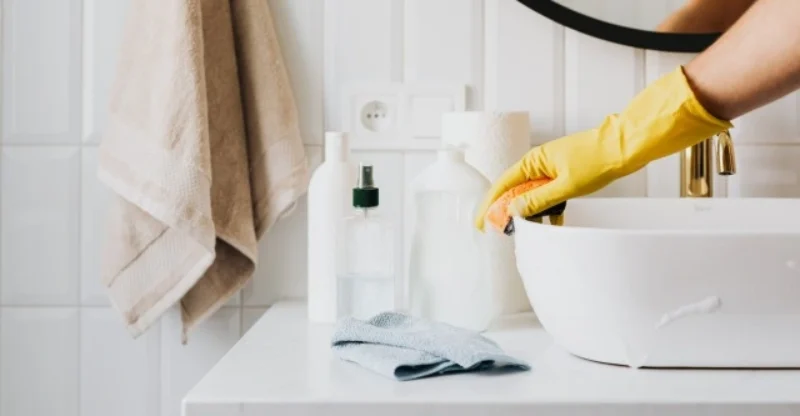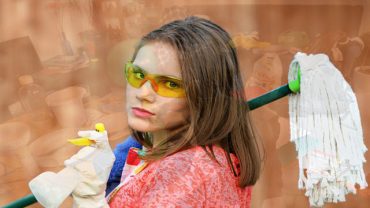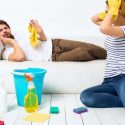Bad Cleaning Habits: 7 Common Mistakes To Avoid
I stood in my living room, noticing the dust and clutter. I felt frustrated despite my hard work. My cleaning habits needed to be fixed. I had to tackle these challenges to make my home a welcoming haven.
After looking into it, I found several bad habits that make a home dirtier, including using dirty tools, using the wrong cleaner, and not following product advice.
The list also includes leaving dishes dirty and using too much cleaner. These habits can spread germs, damage surfaces, and even pose health risks.
It’s time to stop these harmful practices and start fresh. Learning better cleaning methods allows us to enjoy a cleaner, safer living space.
1. Using Dirty Cleaning Tools
Keeping my home clean and safe means not using dirty tools. Studies show that reusing dirty mops, sponges, and other cleaning supplies spreads germs. It makes cleaning less helpful and could add bacteria to my home.
I’ve learned that reusing dirty mops and sponges is a no-go. These tools pick up dirt and even bad bacteria, which can spread to other places I’ve cleaned. I need to wash and disinfect them every time to keep things clean.
Using dirty tools can spread germs. For example, a mop used in the bathroom might spread germs to the kitchen. Keeping my tools clean helps prevent this. It also ensures that my cleaning is really making my home healthier.
It’s critical to clean my cleaning tools regularly. This means washing mop heads and sponges and wiping down broom handles. Doing this, I keep germs away and help my tools do their job. This makes my home cleaner and safer.
2. Misusing Harsh Cleaners
Keeping our homes clean and healthy is a top priority. However, using harsh cleaners the wrong way can create big problems. It’s proven that using too much bleach and strong chemicals is risky. It can hurt our health, make us sick, and damage our things.
Mixing cleaning products is a big no-no. Doing so can produce dangerous fumes that harm us. Make sure to clean with strong products in a well-ventilated area. Wear gloves and a mask to protect yourself. This will help prevent issues like skin burns or irritated eyes.
Strict rules must be followed for bleach and other strong cleaners. Always follow the label. Use the amount suggested and mix it with water. And remember, never mix different cleaners together. This guideline keeps your home clean and safe while also protecting your belongings.
3. Leaving Dirty Dishes in the Sink
Leaving dirty dishes in the Sink is a common bad habit. It may seem not so bad, but it can lead to bacteria growth. As a homeowner, avoiding this habit is crucial for a cleaner home.
Dirty dishes in the Sink attract harmful bacteria like salmonella and E. coli. If the dishes aren’t washed, these germs can quickly spread. To keep your home clean, wash dishes right after using them. If not, put them in the dishwasher to stop bacteria from growing.
When you’re busy, putting dishes in the dishwasher is smart. It keeps your kitchen cleaner and helps in the overall cleaning process. By doing this regularly, your home will stay neat and bacteria-free.
4. Leaving Wet Towels and Shower Curtains Bunched
Leaving wet towels bunched up or a shower curtain closed can create a damp environment perfect for mould and mildew.
To prevent this, spread out your shower curtain to let it dry after each use. Similarly, hang up your towels and wash them regularly. These simple habits can make a big difference in the cleanliness of your bathroom.
5. Using Disinfectant Wipes on Food Surfaces
Disinfectant wipes are now a common sight in many cleaning routines. But, we must avoid using them on surfaces touching food. They often have chemicals that can be harmful if swallowed.
Experts in cleaning services warn against using disinfectant wipes on food spots like countertops. These spots need gentle cleaning supplies made for food areas. Using strong chemicals can be dangerous if they’re not wiped off properly.
Instead, pick mild, food-safe cleaners or just warm water and soap for the kitchen. This way, your surfaces will be safe without harmful, everyday bad cleaning habits. Always keep your family safe first when cleaning your home.
6. Shoes in the house
Walking around the house in the same shoes you’ve worn outside can bring in dirt, germs, and allergens. This not only makes your floors dirtier, but it can also affect the air quality in your home.
To keep your home cleaner, make it a rule to remove your shoes as soon as you enter the house. Consider having a pair of indoor shoes or slippers that you can change into.
7. Paper Clutter
The first step to tackling paper clutter is to reduce the amount of paper coming into your home. Opt for digital versions of bills, statements, and newsletters whenever possible. Create a filing system for the paper you need to keep.
This doesn’t have to be complicated – even a simple box with folders for different categories can work. Next, make it a habit to deal with paper immediately. When you get the mail, please take a few minutes to sort through it.
Recycle junk mail, file important documents, and deal with any items that require action. Finally, set aside regular times to declutter your paper.
This could be once a week, monthly, or whatever works best for you. During this time, go through your papers and remove anything that’s no longer needed.
Conclusion
The data pointed out many bed cleaning habits we should avoid. This includes using dirty tools and not following product instructions. Also, leaving dirty dishes can make things worse.
Changing these habits is vital to keep a clean and healthy home. Make sure to clean your tools well and use supplies correctly. Organizing your cleaning can also make a big difference.
FAQs
Start by identifying your bad habits. Then, create a plan to tackle them one at a time. Be patient with yourself – breaking old habits and forming new ones takes time.
This could be due to several reasons, such as clutter, not cleaning regularly, or using dirty cleaning tools. Try implementing the tips in this guide to see if they make a difference.
Some good habits include cleaning up spills immediately, doing a little cleaning each day, and keeping your cleaning tools clean and well-maintained.



